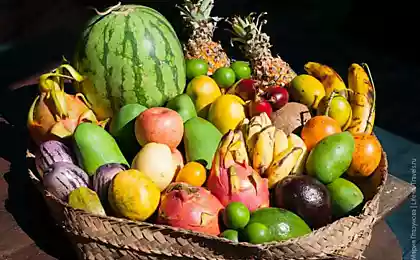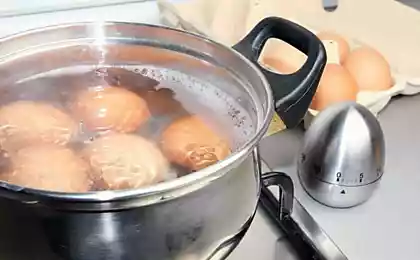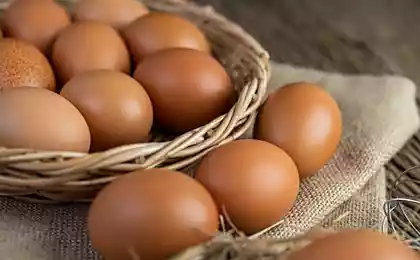626
Fraud in the store: the tricks with the freshness, size, and wash in the sale of eggs
About the benefits used in the human diet of chicken eggs is known to all. This product is truly a storehouse of nutrients, so necessary for our body.
But if all the eggs turn out on the shelves, equally useful? And what we, the buyers, can guide the choice of a particular manufacturer of the product. Let's face it.
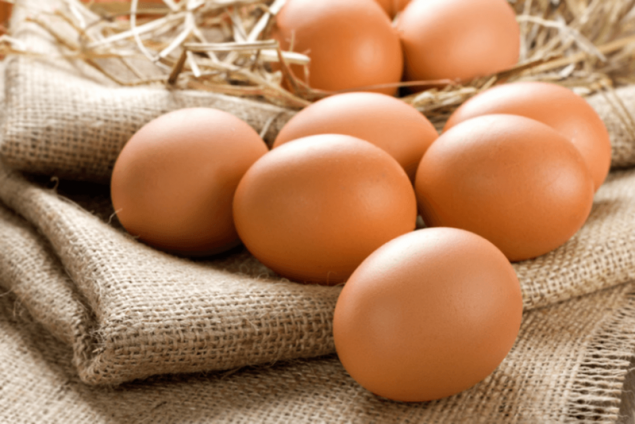
Without a doubt, the main factor affecting the quality of the eggs, serve the sanitary-epidemiological conditions in which poultry in the enterprise, forage composition in the diet of laying hens and the level of technological processes, built on one or another farm under prescribed rules for this and rules.
For obvious reasons, for the consumer to receive such information is extremely difficult, and therefore to catch representatives of agricultural holdings in bad faith with the release of their products is often not so easy.
By what criteria can we judge the quality of eggs that turned in front of us on the store shelf?
Date of issue eggs: what is the number put on the packaging
First of all, the product needs to be fresh. For this, Standards are defined in the terms and conditions of its storage.
Please note, if the marking with the date located on the shell of eggs, then with high probability a poultry farm date of production from the conveyor (date sorting).
The same applies to the date shown on the packaging of a product if it is presented in the store under the brand name of a particular poultry farm. Quite often there are cases when the packaging States that only the date of filling of eggs, and not the date of production (sort), which is a serious violation.
How to cheat in shops when selling eggs
The fact that poultry usually work with stores not directly. And the first product gets to the warehouse of intermediaries, where they perefasovyvayut eggs in its consumer packaging and sent to the stores under its brand.
At this stage, products can linger in the warehouse of the suppliers a longer time.
This may violate the conditions of storage of this product. At this stage, some unscrupulous suppliers are all sorts of tricks, including a thrashing of the date of packaging on later before shipping. Then, as the date sorting of eggs for the production of intentionally not specified.
In this case, the consumer the right to read the document (or its copy) in which the supplier certifies the conformity of quality and product safety the requirements of the current standard for this type of product, as well as veterinary document (or a copy) installed on the territory of States that have adopted the standard.
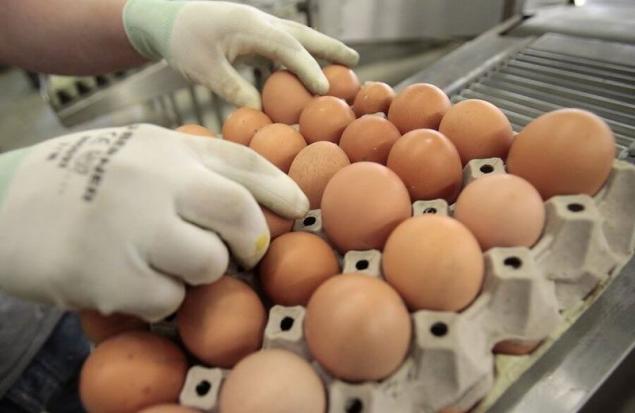
What eggs will be the freshest
Check chicken eggs for freshness, using "candling", if available in the sales area of the store. When transmission is:
All of this suggests that the buyer is dealing with a stale product, or you have violated the conditions of its storage.
Unfortunately, in my opinion, to date, the law ambiguously interprets the responsibilities of the organizations, representing and selling eggs to have a "candling".
Check chicken eggs for freshness you can and at home. For this you must place the egg in a container of cold water (so that it is completely under water). A fresh egg will lie on the bottom of the tank on the side. If the egg takes under water vertical position or even POPs up it says that the egg is stored for a long time, or were seriously violated the conditions of its storage.
Based on the foregoing, it is recommended to buy eggs, date sort, which is as close as possible to the date of purchase.
You can also follow the choice of products local (to the region) poultry farms. Typically, this reduces the delivery time chicken eggs from the producer to the shop counter.
IMPORTANT to KNOW: not permitted lack of markings on the shell of chicken eggs.
Type and size: control of the seller
To evaluate the quality of eggs we can also according to their appearance.
First, sometimes even visually or using weights you can determine whether in front of the products that we claimed categories.
Category of eggs depends on their size:
Deviations from the minimum mass of a single egg for this category should not exceed 1 g.
Party containing more than 6% of the eggs mass belong to the lower category, up to the counter on the appropriate of the following categories.
Secondly, according to GOST, the eggs must be clean, no blood stains, droppings and damage. In this case, the shell of table eggs allowed the presence of spots, dots and stripes (traces of the contact of the eggs with the floor of the cage or conveyor for collecting eggs), occupying not more than 1/8 of its surface.
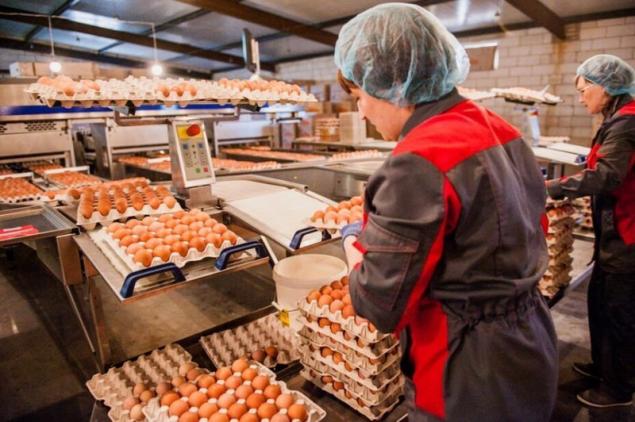
Chicken manure and feathers: can I buy these eggs?
Quite often on the shelves of stores you can find eggs with traces of chicken manure and fragments of feathers. It's not always about the low quality of production on the farm as a whole and may be a factor of interruption of the conveyor for collecting eggs.
However, even temporary technical failure does not relieve manufacturers of responsibility for compliance with prescribed requirements. The presence in the party heavily soiled eggs, of course, is a gross violation of sanitary norms and rules.
How to wash eggs on the farm
Contaminated shell can cause the disease salmonellosis. Because "Salmonella" just lives in the intestine and poultry manure. And its resilience is surprising high – it is not dying or in dry litter, nor at low temperatures. On poultry farms are allowed to handle contaminated eggs special detergent, approved for use in the prescribed manner. And applied to such eggs special markings. In practice, most poultry farms ignore these procedures, since the use of detergents is almost twice reduces the allowable storage time of products. Washed eggs are stored no longer than 12 days!
But the color of the shell (white or brown) absolutely does not affect the quality and taste of the eggs depends absolutely only on the breed of the hens. There is nothing terrible in the bright yolk, its rich color only indicates that the bird was eating food enriched with carotene. Additive in the diet of laying hens of certain vitamins and minerals pretty common in the workplace. Some poultry farms under its brand produce eggs, for example, enriched with "selenium" or "iodine".
Portrait of a perfect egg
Example of the quality of the product is fresh chicken egg without a trace of contamination by the waste products of birds, the size of which corresponds to the stated in the labeling category.
Also wondering: Do quail eggs more useful
Locavores: where was born — there and eat
Reference
A chicken egg contains 40 chemical elements: phosphorus, boron, potassium, magnesium, zinc, cobalt, aluminum, iodine, copper, etc In its composition about 20 amino acids, and many vitamins, including group "B".
The biological value of eggs makes it unique and, indeed, an indispensable product in the human diet! published
Author: Malakhov Andrey
Source: roscontrol.com/community/article/ei-uvazhaemyi-a-gde-zhe-iaitsa/#
But if all the eggs turn out on the shelves, equally useful? And what we, the buyers, can guide the choice of a particular manufacturer of the product. Let's face it.

Without a doubt, the main factor affecting the quality of the eggs, serve the sanitary-epidemiological conditions in which poultry in the enterprise, forage composition in the diet of laying hens and the level of technological processes, built on one or another farm under prescribed rules for this and rules.
For obvious reasons, for the consumer to receive such information is extremely difficult, and therefore to catch representatives of agricultural holdings in bad faith with the release of their products is often not so easy.
By what criteria can we judge the quality of eggs that turned in front of us on the store shelf?
Date of issue eggs: what is the number put on the packaging
First of all, the product needs to be fresh. For this, Standards are defined in the terms and conditions of its storage.
- For diet of eggs , the storage period cannot exceed more than 7 days.
- For table eggs shelf life at temperatures from 0 °C to 20 °C — not more than 25 days and at a temperature of minus 2 °C to 0 °C and not more than 90 days.
Please note, if the marking with the date located on the shell of eggs, then with high probability a poultry farm date of production from the conveyor (date sorting).
The same applies to the date shown on the packaging of a product if it is presented in the store under the brand name of a particular poultry farm. Quite often there are cases when the packaging States that only the date of filling of eggs, and not the date of production (sort), which is a serious violation.
How to cheat in shops when selling eggs
The fact that poultry usually work with stores not directly. And the first product gets to the warehouse of intermediaries, where they perefasovyvayut eggs in its consumer packaging and sent to the stores under its brand.
At this stage, products can linger in the warehouse of the suppliers a longer time.
This may violate the conditions of storage of this product. At this stage, some unscrupulous suppliers are all sorts of tricks, including a thrashing of the date of packaging on later before shipping. Then, as the date sorting of eggs for the production of intentionally not specified.
In this case, the consumer the right to read the document (or its copy) in which the supplier certifies the conformity of quality and product safety the requirements of the current standard for this type of product, as well as veterinary document (or a copy) installed on the territory of States that have adopted the standard.

What eggs will be the freshest
Check chicken eggs for freshness, using "candling", if available in the sales area of the store. When transmission is:
- visible enlarged air chamber;
- the yolk is large, dark, close to the shell or stuck to it, bounds it delineated more sharply than in a fresh egg;
- protein liquid, so the yolk is very flexible.
All of this suggests that the buyer is dealing with a stale product, or you have violated the conditions of its storage.
Unfortunately, in my opinion, to date, the law ambiguously interprets the responsibilities of the organizations, representing and selling eggs to have a "candling".
Check chicken eggs for freshness you can and at home. For this you must place the egg in a container of cold water (so that it is completely under water). A fresh egg will lie on the bottom of the tank on the side. If the egg takes under water vertical position or even POPs up it says that the egg is stored for a long time, or were seriously violated the conditions of its storage.
Based on the foregoing, it is recommended to buy eggs, date sort, which is as close as possible to the date of purchase.
You can also follow the choice of products local (to the region) poultry farms. Typically, this reduces the delivery time chicken eggs from the producer to the shop counter.
IMPORTANT to KNOW: not permitted lack of markings on the shell of chicken eggs.
Type and size: control of the seller
To evaluate the quality of eggs we can also according to their appearance.
First, sometimes even visually or using weights you can determine whether in front of the products that we claimed categories.
Category of eggs depends on their size:
- higher, marking and weighing 75 g;
- select "About" weighing 65 – 74,9 g;
- the first "S1" weight 55 and 64.9 g;
- the second "C2" weighing 45-54,9 g;
- the third "C3" with a weight of 35-44,9,
Deviations from the minimum mass of a single egg for this category should not exceed 1 g.
Party containing more than 6% of the eggs mass belong to the lower category, up to the counter on the appropriate of the following categories.
Secondly, according to GOST, the eggs must be clean, no blood stains, droppings and damage. In this case, the shell of table eggs allowed the presence of spots, dots and stripes (traces of the contact of the eggs with the floor of the cage or conveyor for collecting eggs), occupying not more than 1/8 of its surface.

Chicken manure and feathers: can I buy these eggs?
Quite often on the shelves of stores you can find eggs with traces of chicken manure and fragments of feathers. It's not always about the low quality of production on the farm as a whole and may be a factor of interruption of the conveyor for collecting eggs.
However, even temporary technical failure does not relieve manufacturers of responsibility for compliance with prescribed requirements. The presence in the party heavily soiled eggs, of course, is a gross violation of sanitary norms and rules.
How to wash eggs on the farm
Contaminated shell can cause the disease salmonellosis. Because "Salmonella" just lives in the intestine and poultry manure. And its resilience is surprising high – it is not dying or in dry litter, nor at low temperatures. On poultry farms are allowed to handle contaminated eggs special detergent, approved for use in the prescribed manner. And applied to such eggs special markings. In practice, most poultry farms ignore these procedures, since the use of detergents is almost twice reduces the allowable storage time of products. Washed eggs are stored no longer than 12 days!
But the color of the shell (white or brown) absolutely does not affect the quality and taste of the eggs depends absolutely only on the breed of the hens. There is nothing terrible in the bright yolk, its rich color only indicates that the bird was eating food enriched with carotene. Additive in the diet of laying hens of certain vitamins and minerals pretty common in the workplace. Some poultry farms under its brand produce eggs, for example, enriched with "selenium" or "iodine".
Portrait of a perfect egg
Example of the quality of the product is fresh chicken egg without a trace of contamination by the waste products of birds, the size of which corresponds to the stated in the labeling category.
Also wondering: Do quail eggs more useful
Locavores: where was born — there and eat
Reference
A chicken egg contains 40 chemical elements: phosphorus, boron, potassium, magnesium, zinc, cobalt, aluminum, iodine, copper, etc In its composition about 20 amino acids, and many vitamins, including group "B".
The biological value of eggs makes it unique and, indeed, an indispensable product in the human diet! published
Author: Malakhov Andrey
Source: roscontrol.com/community/article/ei-uvazhaemyi-a-gde-zhe-iaitsa/#
Varieties of water purification systems for country houses
The 10 principles of perfect start of the day







